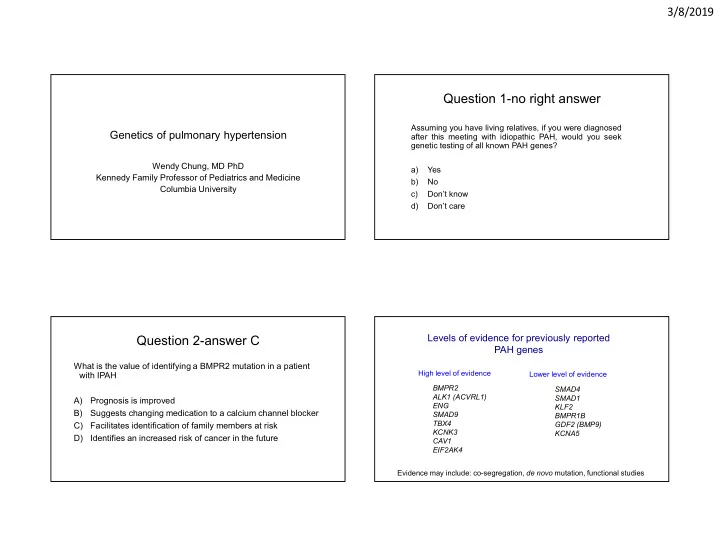

3/8/2019 Question 1-no right answer Assuming you have living relatives, if you were diagnosed Genetics of pulmonary hypertension after this meeting with idiopathic PAH, would you seek genetic testing of all known PAH genes? Wendy Chung, MD PhD a) Yes Kennedy Family Professor of Pediatrics and Medicine b) No Columbia University c) Don’t know d) Don’t care Levels of evidence for previously reported Question 2-answer C PAH genes What is the value of identifying a BMPR2 mutation in a patient High level of evidence Lower level of evidence with IPAH BMPR2 SMAD4 ALK1 (ACVRL1) SMAD1 A) Prognosis is improved ENG KLF2 B) Suggests changing medication to a calcium channel blocker SMAD9 BMPR1B TBX4 C) Facilitates identification of family members at risk GDF2 (BMP9) KCNK3 KCNA5 D) Identifies an increased risk of cancer in the future CAV1 EIF2AK4 Evidence may include: co-segregation, de novo mutation, functional studies 1
3/8/2019 BMPR2 mutations increase the risk of pulmonary hypertension but Mutations identified to date in HPAH and PVOD do not guarantee the person will ever develop pulmonary hypertension ? AQP1 KCNK3 BMP9 /10 Cav1 Endoglin ATP13A3 ALK1 BMPRII P P P EIF2AK4 P P P Smad5 Smad8 Smad1 Smad 4 • Individuals who have a BMPR2 gene mutation are at risk to develop TBX4 Targets PH but may never develop the disease. TF (including ID1-4) • Currently there is NO way to determine if a person with a BMPR2 SOX17 P gene mutation will or will not develop PH P BRE HPAH PVOD/PCH Determinants of penetrance Worse survival in BMPR2 mutation carriers Death or transplantation Total Age<50 population At diagnosis * No mutation No mutation * Mutation Mutation * p=0.002 p<0.0001 * Evans et al. Lancet Respir Med 2016 2
3/8/2019 Earlier disease onset, poor response to therapy and high rates of transplantation in Reasons to Perform Genetic Testing biallelic EIF2AK4 mutation carriers • Confirm the diagnosis 94 PVOD/PCH patients • Avoid additional diagnostic testing (lung biopsy) 28% carried biallelic EIF2AK4 mutations • Refine prognosis • Preparation for future molecularly based treatments Drug induced pulmonary edema in 23% of mutation carriers • Inform risk stratification for family members • Duty to inform • Facilitate early diagnosis of family members • Inform reproductive options • Preimplantation genetic diagnosis • Address patient concerns about etiology: why me? Montani et al. Lancet Respir Med 2017 Who Should Have Genetic Testing? Resources to Assist With Genetic Testing • Family history tools • Paper screening tools Group I PAH • https://familyhistory.hhs.gov/ • Familial PAH • Educational materials • IPAH (greatest number of BMPR2 mutation carriers are in this group) • Videos https://www.youtube.com/watch?v=36rlvtj_Qrs • PVOD/PCH • https://www.genomicseducation.hee.nhs.uk • Genetic Home Reference (https://ghr.nlm.nih.gov/) • Children • Genetic Testing Registry (https://www.ncbi.nlm.nih.gov/gtr/) • Easier biological samples (saliva, buccal swabs, as well as blood) • Telemedicine/video conference options for pre-test and post-test education and genetic counseling • Genetic counseling is critical for unaffected family members 3
3/8/2019 Comparison of Genetic Test Results in What Test to Order? Adults and Children Adult Pediatric (age < 18) • Familial mutation when known • BMPR2 including deletion analysis FPAH • Panels of PAH genes • Exomes (after a negative panel) N=79 N=25 • Familial cases • Pediatric/early onset cases (with parents to identify de novo mutations) IPAH Zhu et al, Circ CV Genetics 2018 N=178 N=130 Management of Mutation Positive/Untested Family Members • Monitoring suggestions are not evidence based • Annual echocardiogram • Immediately evaluate respiratory symptoms/syncope • For EIF2AK4 measure diffusion coefficient on pulmonary function tests 4
Recommend
More recommend